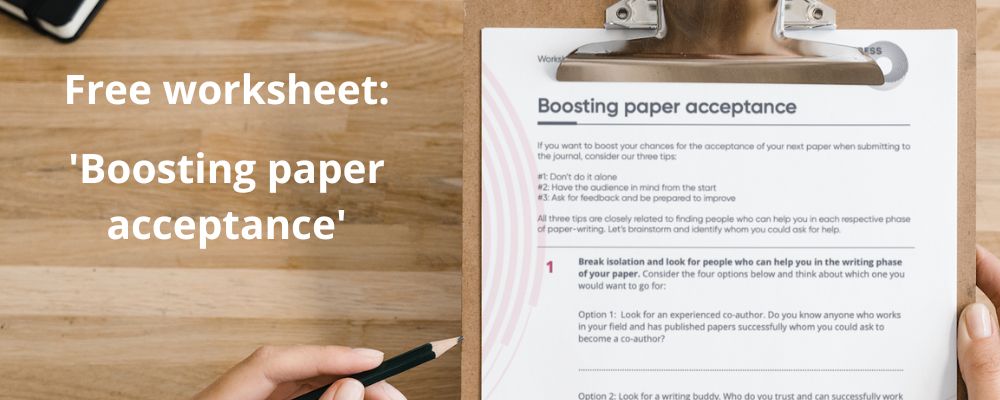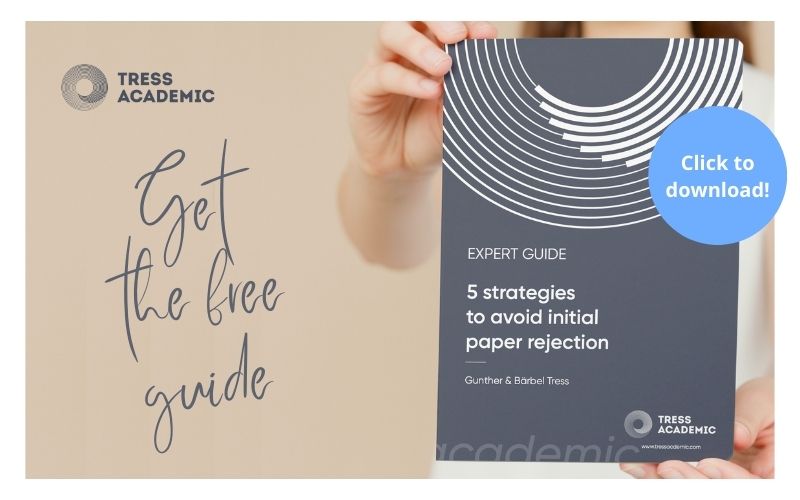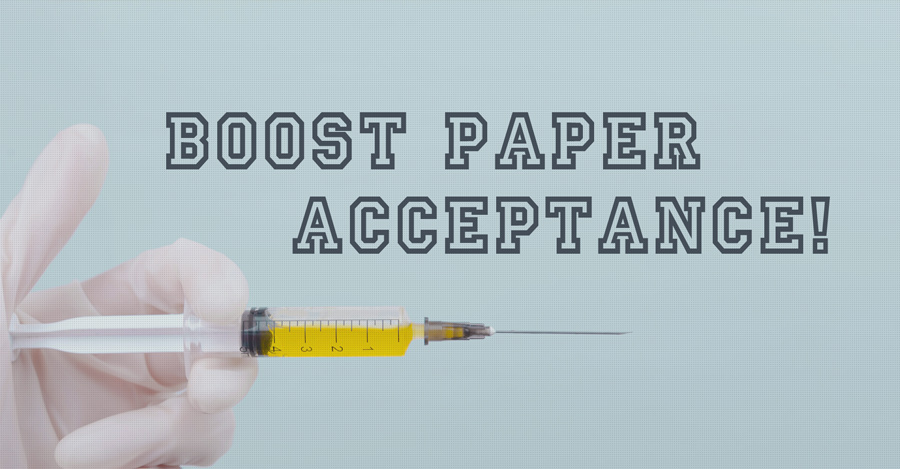Often, we’ve been asked “What can I do to increase the chances of my paper getting accepted?” Many might think you should add more references from important people, present a super-cool new method, or be in the lucky position to base your results on an amazingly large sample. Sure, these all might help, but they’re probably not all applicable to you. Therefore, here are three tips that everyone can utilize from the start that can make a huge impact on the quality of your paper and thus, influence whether your paper gets accepted by a journal or not.
Not everyone is lucky enough to present an amazing new method in their next paper, offer stunning results, or make a ground-breaking contribution to their research field. Not everyone can “just write a great paper and get published,” we know. But if you have done valuable work, you’ll want it to be published soon. So what can you do to increase the chances of getting your paper into a journal?
Below, we’ll suggest three tips that will have an enormous influence on the quality of your paper. They’re not about how to phrase an irresistible title for your paper or fine-tune your abstract to stand out (find more about how to write a great abstract here). Instead, we’ll focus on three actions that you can always do, regardless of what the paper is about and how special your findings are. What we’ve suggested deals with three important steps in the writing process.
Let’s first get an overview of these three steps and then you can download our worksheet “Boosting paper acceptance” and think about how you can implement them in your paper-writing process.

Tip #1: Don’t go for it alone
Particularly, if you are new to paper-writing and about to write your first manuscript, don’t think you have to do all of this on your own. No, there’s no need to go down that route of trial and error. Paper-writing is a skill, and you can learn it. Writing a paper gets easier when you learn how to do it right, and doesn’t have to be like jumping into deep water and hoping you’ll swim.
What better way to learn than having someone help you–someone who has been through the process before and knows the pitfalls and obstacles of the process! It’s great to learn from a role model who already went through the process and mastered it successfully, someone who got accepted in journals.
The advice, the feedback and the pure exchange of ideas you’ll experience when you write your paper collaboratively will substantially increase the quality of your text. It will also help you avoid many traps that you could fall into on your way to publication. And It means getting encouragement while writing your paper.
We suggest four options for how you can break the isolation of the lonely writer and benefit from a supporting person:
(1) Look for an experienced co-author.
Don’t be shy! Approach colleagues whom you know have successfully published journal papers. Ask them for advice, tell them what you would like to write about, and ask them whether they have any ideas on how to improve not only your writing but also the research steps behind it. They don’t have to be from your institute, as many researchers find it easier to co-author a paper with colleagues from other institutes. Be open about your intentions, and clearly define what you expect from your co-author and make it clear that you offer co-authorship on the paper. For further details on what you can expect from a co-author, check our post Five criteria every academic author should fulfil.
(2) Look for a writing buddy.
A more casual option is to look for a good writing buddy to help you make progress on your paper. Such a buddy could be a colleague in your field or a friend, who’s writing a paper as well. It is more a collaboration of equals than writing with an experienced co-author.
Writing buddies not only help each other in paper-writing, but also provide mental support and encouragement in those moments when your mood is down. You both benefit from the collaboration equally. The specific benefits of a writing buddy are that it increases the accountability of your writing and your commitment to the writing process, and therefore, you’ll produce a paper. A buddy can help you in many parts of the paper to improve your writing, and finally, you know that there’s always someone for you, and that you’re never alone. Check our post Four reasons why a writing buddy can help you! to find out why it might be really good for you to look for a writing buddy.
(3) Join a writing community
A writing community is like a sounding board or a support group that provides help to all its members in the writing process. It’s a great opportunity to break isolation and connect with other, like-minded writing pals. The community meets regularly at a fixed time to facilitate writing or to discuss progress and problems with your paper. Everyone contributes and benefits—a great system if it is set up properly. These days, it can be done online to make it easily accessible for everyone. Check our post How to create and make use of an online writing community for further details.
(4) Follow a writing training or coaching
Another good option to both improve the quality of your writing and escape the feeling of being lost and lonely, is to follow a paper-writing programme or receive individual coaching sessions. In both cases, an experienced advisor will alert you to common problems in paper writing and will know great tools to overcome the feeling of being stuck on your paper. Sometimes, paper-writing is an overwhelming and complex process, and it is easy to lose control of the different steps that need to be done. Why not look for a mentor who can guide you on your paper-writing journey and make sure you stay on track? Check out our online and digital mentoring programmes for paper-writing to see what we mean.
Tip #2: Have the audience in mind from the start
Why are you writing a paper? What is the motivation behind it? We’ve heard all sorts of answers to these questions. “Because I have to” is one of the most common responses. It translates to “It’s expected of me and in order to move on with my project, my position, my career, I have to do it.” It doesn’t sound like you want to do it—it’s a duty.
But in the many conversations we have with researchers, there’s another very important motivation expressed–you just have to dig a bit deeper: You write because you want to tell your peers about your research so that they can benefit from it. Yes, this is certainly a great motivation, and probably the main purpose of academic writing overall.
If you share this purpose—and we’re sure you do—then you shouldn’t forget it when writing your paper. You want to inform your colleagues about your research, okay, so why not have the colleagues you’ll write for in mind from the start?
Instead of writing the paper for only you, write it in a way that fits the interest and knowledge of the peers you are actually writing it for. To do this, you need to answer a few questions early on:
- Which colleagues am I writing for?
- Why should they read this paper?
- What will be most interesting to them?
- What will they gain from my paper?
- What do they know about my topic?
- What do they not know about it?
- How can I write the paper in a way that easily and succinctly conveys my message to them?
Thinking about these questions from the start and writing the paper with your readers in mind—in every section of the paper—will substantially improve the readability and quality of your paper!
As a next step, you need to find the right journal serving the audience that you want to reach. It doesn’t help if you write a paper for audience X and then submit it to a journal that is hardly read by audience X. The journal needs to be the place where audience X will look for your paper. In our post Find the right journal for your paper following these 8 steps, we guide you through how to find the right journal for your paper.

Tip #3: Ask for feedback and be prepared to improve
You probably recognize this moment in paper-writing: You have been working diligently for weeks on your paper, co-authors have contributed and provided comments, you’ve formatted the paper according to the rules of the journal, you’re exhausted and want to send this paper off to clear up space and finally do something else. Does this sound familiar?
Our tip #3 comes in at exactly this moment: Don’t submit the paper before you have asked one or two independent colleagues for advice on your finished manuscript. No, we don’t mean you should ask your co-authors again—they all have a stake in your paper, and they want to get it published as soon as possible. Instead, find nice independent colleagues to whom you could give the paper, and ask them to provide critical comments and feedback on the paper. Tell them that you’re about to submit to Journal XYZ and you would love to hear what they think about the paper and whether they have any comments or ideas on how to improve it.
This process takes a little bit of time, but it is a worthwhile investment and substantially shortens the time your paper spends in peer-review. It is better to get some critical comments from your colleagues now so you can fix the issues before you submit. This will give your paper a better start in peer-review. You can also give your colleagues a few specific questions they should look at, or tell them about some issues that you have with the paper—they may know how to solve them in a way you and your co-authors didn’t come up with before.
This step is an essential quality check of your paper prior to submission. Your colleagues are your first readers, and since you are writing for readers, it is a good idea to ask real readers for their feedback before you submit. The editors and the reviewers of the journal you’ll submit to later are also just readers of your paper—so you better have checked what your readers think about the paper before you submit.

Conclusion
You see, all three tips to boost your paper acceptance have nothing to do with any technical issues and don’t include any secret tricks for how to write a paper section in a specific way. No, what they have in common is that they all deal with people: those who can help you write a better paper, those you’re writing the paper for, and those who can provide fair judgment on your paper before you hand it in to the journal. Keeping all of these people in mind in paper-writing will tremendously boost your chances of getting accepted. Now, download our worksheet “Boosting paper acceptance” and get started identifying the people that can help you.

Resources:
- Worksheet: Create your online writing community
- Blog post #1: How to write a paper abstract?
- Blog post #91: Find the right journal for your paper following these 8 steps
- Blog post #104: Five criteria every academic author should fulfil
- Blog post #109: Four reasons why a writing buddy can help you!
- Blog post #110: How to create and make use of an online writing community
More information
Do you want to successfully write and publish a journal paper? If so, please sign up to receive our free guides.
Photo by Diana Polekhina on Unsplash
© 2022 Tress Academic
